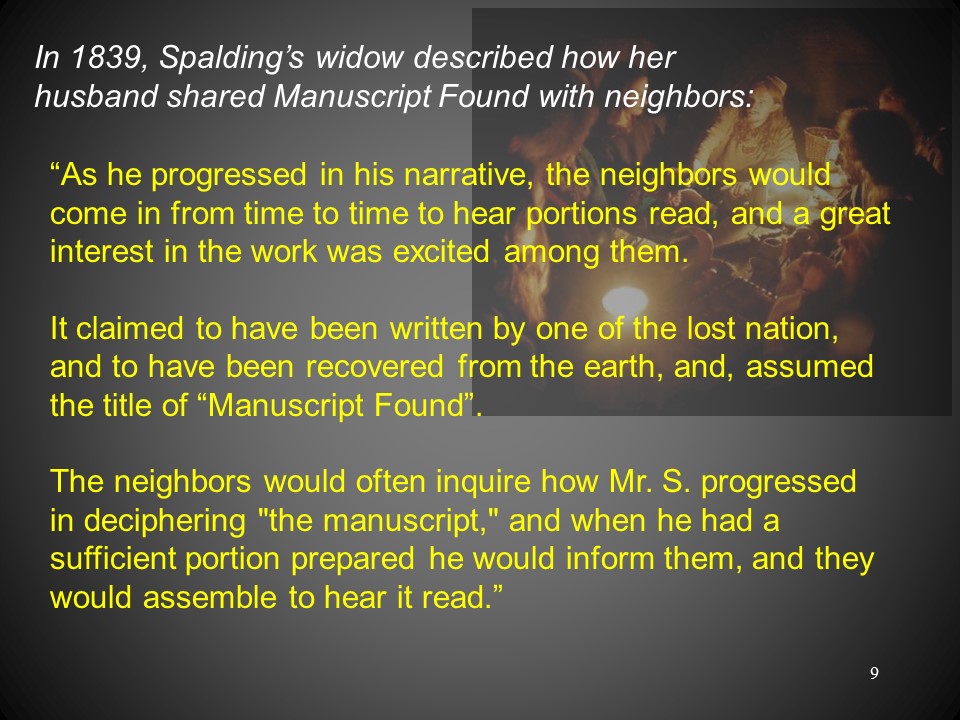Matilda Spalding Davison’s Letter to the Boston Daily Advertiser. ORIGIN OF THE “BOOK OF MORMON”, OR “GOLDEN BIBLE”. April 1, 1839.
Other witness statements:
• • • • • •
Artemus Cunningham (1833):
“Before showing me his [Spalding’s] manuscripts, he went into a verbal relation of its outlines, saying that it was a fabulous or romantic history of the first settlement of this country, and as it purported to have been a record found buried in the earth, or in a cave, he had adopted the ancient or scripture style of writing. He then presented his manuscripts , when we sat down and spent a good share of the night, in reading them, and conversing upon them.”
• • • • • •
Excerpts from John Spalding (Solomon’s brother, 1833):
“…The book was entitled the “Manuscript Found”
“…historical romance of the first settlers of America”
“…American Indians are the descendants of the Jews, or the lost tribes”
“…account of their journey from Jerusalem”
“…under the command of Nephi and Lehi”
“…Nephites and the other Lamanites. Cruel and bloody wars ensued, in which great multitudes were slain.”
“….mounds”
“…nearly the same historical matter, names, &c.”
“…he wrote in the old style, and commenced about every sentence with “and it came to pass,” or “now it came to pass,” the same as in the Book of Mormon”
• • • • • •
Excerpts from Oliver Smith – landlord (Aug 1833):
“…historical novel, founded upon the first settlers of this country”
“…journey from Jerusalem, by land and sea, till their arrival in America”
“…mounds”
“… Nephi and Lehi were… leading characters, when they first started for America”
“… no religious matter was introduced”
“….when it is printed, it will bring me a fine sum of money”
“…When I heard the historical part … I at once said it was the writings of old Solomon Spalding”
• • • • • •
Aaron Wright – neighbor (August 1833):
“….the lost tribes of Israel…were the first settlers of America”
“…the Indians were their descendants”
“….journey from Jerusalem to America, as it is given in the Book of Mormon, excepting the religious matter”
“…the names more especially are the same without any alteration
“…Spalding had many other manuscripts, which I expect to see when Smith translates his other plates”
• • • • • •
Abner Jackson (son of a friend, 1880):
In response to a solicitation from lawyer John Aiken, Jackson gave a lengthy statement in December of 1880 which was published in The Daily Evening Reporter (Washington, PA) on Jan 7, 1881. Jackson was the son of a friend of Spalding’s. Here is an excerpt:
“Spaulding read much of his manuscript to my father, and in conversation with him, explained his views of the old fortifications in this country, and told his romance. A note in Morse’s Geography suggested it as a possibility that our Indians were descendents of the lost tribes of Israel…. the old fortifications and earth mounds…convinced him that they were a…more enlightened and civilized than are found among the Indians among us at this day. These facts and reflections prompted him to write his Romance, purporting to be a history of the lost tribes of Israel. He begins with their departure from Palestine, or Judea, then up through Asia, points out their exposures, hardships and sufferings, also their disputes and quarrels, especially when they built their craft for passing over the straits. Then after their landing, he gave an account of their divisions and subdivisions under different leaders, but two parties controlled the balance.”
• • • • • •
Witnesses mentioning the Behring Straits:
Abner Jackson, 1855, 1880 – “over the Straits”
Daniel Tyler, 1878 – “across Behring Straits”
Matilda McKinstry, 1886 – “across Behring Straits”
Redick McKee, 1869, 1886 – “China, across Behring Straits”
These late-period statements do not indicate an attempt to describe the contents of the Book of Mormon, as it does not contain any mention of the Behring Straits.
• • • • • •
Other likely elements in Manuscript Found:
Spalding likely introduced racial themes into Manuscript Found. In Spalding’s day the extinct mound-builders were generally thought of as having originally been light-skinned people from the Old World. Spalding indulged in this same racism in his Manuscript Story when he provided his fictional “Ohians” with a light “olive” skin, and his fictional family of Lobaska with lighter skins. Presumably he also gave his Romans, the culturally superior group in the story, the whitest skins of all.
